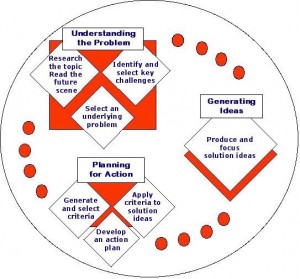Global Issues Problem Solving
Global Issues Problem Solving (GIPS) engages students in deep learning as they grapple with existing or emerging international issues. Topics are submitted by students and teachers around the world and they then have an opportunity to vote on which topics will be chosen for the year. There are five topics. Most students complete three of these during Terms 1 – 3. The other two topics are for the National Finals and the International Finals. Topics are always chosen from a range of disciplines.
For this year’s topics, with descriptors, click here.
After researching the topic, students are presented with a one-page futuristic scenario, the ‘future scene’ which extrapolates existing trends and adds futuristic elements. They research the topic in depth, then learn and apply the six-step future problem solving process.

‘It does change your view of the world. It makes you more world-aware. You read articles and people discussing the ethical dilemmas or robotics on the BBC website, and you can go, 'Hey, we've been through all of this already! I know what everyone is talking about’ and you do become a much better thinker. – Senior Student
Competitive GIPS
Students work in teams of four, or as an individual, with a teacher or mentor, the ‘coach’, who facilitates their research into the current topic and helps them to learn and apply the six-step problem solving process. From February to September the students study the three set topics and work through the problem solving process. The students’ work is sent to a national team of evaluators who assess it and return it with comprehensive feedback and feed forward. Top placed teams from the Qualifying Problem compete at the National Finals for the chance to win a place to represent New Zealand at the International Finals in the USA in June the following year. Primary division teams (up to Yr 6) compete at Nationals but are not eligible to compete at the International finals. Some students prefer to work by themselves and can enter the individual division where they complete a shorter booklet.
Competitive Divisions (Team or Individual):
Primary Division: Up to Yr 6. Y division are eligible for National, but not International Finals – they complete a shorter booklet than the other competitive teams.
Junior B: Years 5 – 7. If Yr 5 – 6 teams want to compete for a place at the International Finals, they have to enter this division.
Junior: Any Junior team which includes Year 8 students
Middle: Years 9 – 10
Senior: Years 11 – 13
Stepping Stones – Non-Competitive
This division is particularly suitable for students and coaches who are attempting Future Problem Solving for the first time, or for teachers who would like to attempt global issues problem solving as a whole class activity. Students work in teams of any size (four is recommended), but individuals can’t do Stepping Stones. Stepping Stones teams usually work on the same topics as the Competitive Divisions, but there is an option of doing alternative topics that may link more closely to classroom topics being studied in the school programme, or in a particular learning area in a secondary school.
Click here to view the available alternative topics.
Stepping Stones teams receive comprehensive feedback on their work, but no marks or rankings. They have a longer period of time than the competitive division to work on their booklets and a comprehensive guidebook to help students and teachers to learn the process. Schools that are new to the programme are able, on a one time only basis, to register in the programme part way through the year. Stepping Stones teams are not eligible for the National Finals.
Stepping Stones Divisions:
Stepping Stones Primary: Years 1 – 6
Stepping Stones Junior, Middle and Senior: Years 7 – 13
